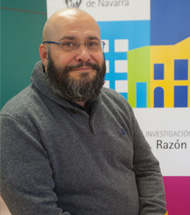"The media fertilize the ground for pseudoscience."
Javier Armentia, astrophysicist and director of the Pamplona Planetarium, gave a CRYF seminar

The group of research Science, Reason and Faith(CRYF) of the University of Navarra invited Javier Armentia, astrophysicist and director of the Pamplona Planetarium to talk about pseudosciences. He started his exhibition showing a video in which the Yeti of Formigal (Huesca) is "seen". That video circulated on the Internet and was nothing more than an advertising campaign, but there were many people who believed it. The speaker used this example as a metaphor to make people understand how pseudosciences are infiltrated in public opinion. "In Formigal there is no room for this subject of beasts". Nor anywhere else.
The origin of pseudosciences comes from science itself, which is sometimes perverted by economic or other interests. "One third of high school students believe in telepathy, astrology, ghosts and extrasensory perceptions. A fifth of these students also believe in witches," Armentia said. The mass media have fertilized the ground with the publication of articles, TV series and magazine programs. He illustrated his speech with several examples of television programs on national generalist channels in which people who move in academic circles are shown, but who, nevertheless, are not scientists at all and affirm aberrations such as subject "cancer is caused by moods", or "it can be cured with lemon infusions".
Pseudosciences are detectable because they use an apparently scientific terminology , but in a misleading and incorrect way. Terms such as "we have worked with world-renowned scientists" are hardly demonstrable. The bait are the endorsements of universities or relevant people that are supposed to give reliability to what is presented. In any case they contradict established scientific facts. "There is an absence of connection with the research or even disregarded," he said.
The director of the Pamplona Planetarium appealed to the responsibility of the Education, from where scientists should be counted on more. "A new culture that includes science is needed: it is a pending task," he insisted. With the current curricula, students "abandon the possibility of relating to science from a very early age. We must continue to cultivate a love for science". And, on the other hand,"we scientists have to explain ourselves better so that good science permeates society, because there is also poor science. We have to be able to explain the differences between a hypothesis and an occurrence: there is a lot of ignorance". He ended with a very eloquent phrase of Einstein : "There are only two infinite things: the universe and human stupidity. And I am not sure about the former".
